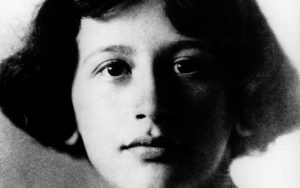Christy Wampole in Aeon:
 Simone Weil (1909-43) belonged to a species so rare, it had only one member. This peculiar French philosopher and mystic diagnosed the maladies and maledictions of her own age and place – Europe in the first war-torn half of the 20th century – and offered recommendations for how to forestall the repetition of its iniquities: totalitarianism, income inequality, restriction of free speech, political polarisation, the alienation of the modern subject, and more. Her combination of erudition, political and spiritual fervour, and commitment to her ideals adds weight to the distinctive diagnosis she offers of modernity. Weil has been dead now for 75 years but remains able to tell us much about ourselves. Born to a secular Jewish family in Paris, she was gifted from the beginning with a thirst for knowledge of other cultures and her own. Fluent in Ancient Greek by the age of 12, she taught herself Sanskrit, and took an interest in Hinduism and Buddhism. She excelled at the Lycée Henri IV and the École normale supérieure, where she studied philosophy. Plato was a lasting influence, and her interest in political philosophy led her to Karl Marx, whose thought she esteemed but did not blindly assimilate.
Simone Weil (1909-43) belonged to a species so rare, it had only one member. This peculiar French philosopher and mystic diagnosed the maladies and maledictions of her own age and place – Europe in the first war-torn half of the 20th century – and offered recommendations for how to forestall the repetition of its iniquities: totalitarianism, income inequality, restriction of free speech, political polarisation, the alienation of the modern subject, and more. Her combination of erudition, political and spiritual fervour, and commitment to her ideals adds weight to the distinctive diagnosis she offers of modernity. Weil has been dead now for 75 years but remains able to tell us much about ourselves. Born to a secular Jewish family in Paris, she was gifted from the beginning with a thirst for knowledge of other cultures and her own. Fluent in Ancient Greek by the age of 12, she taught herself Sanskrit, and took an interest in Hinduism and Buddhism. She excelled at the Lycée Henri IV and the École normale supérieure, where she studied philosophy. Plato was a lasting influence, and her interest in political philosophy led her to Karl Marx, whose thought she esteemed but did not blindly assimilate.
As a Christian convert who criticised the Catholic Church and as a communist sympathiser who denounced Stalinism and confronted Trotsky over hazardous party developments, Weil’s independence of mind and resistance to ideological conformity are central to her philosophy. In addition to her intelligence, other aspects of her biography have captured the public’s imagination. As a child during the First World War, she refused sugar because soldiers on the front could have none. Diagnosed with tuberculosis, she died at 34 when working for the resistance government France libre in London, refusing to eat more than the citizens’ rations of her German-occupied France. Teachers and classmates called her the Martian and the Red Virgin, nicknames suggestive of her strangeness and asexuality. A philosopher who refused to cloister herself behind academia’s walls, she worked in factories and vineyards, and left France during the Spanish Civil War to fight alongside the Durruti Column anarchists, a failed mission in many respects.
Several mystical experiences, including Weil’s discovery of the poem ‘Love (III)’ by the 17th-century poet George Herbert led her to embrace Christianity, and many have called for her canonisation as a saint. In her book Devotion (2017), the Francophile poet and punk-rock star Patti Smith described Weil as ‘an admirable model for a multitude of mindsets. Brilliant and privileged, she coursed through the great halls of higher learning, forfeiting all to embark on a difficult path of revolution, revelation, public service, and sacrifice.’ The French politician Charles de Gaulle thought Weil was mad, while the authors Albert Camus, André Gide and T S Eliot recognised her as one of the greatest minds of her time.
More here.
